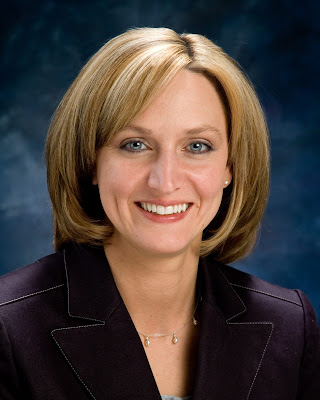

#FacesofPhotonics: CEO of Datalytica Dr. Misty Blowers
https://photonicsforabetterworld.blogspot.com/2019/03/facesofphotonics-ceo-of-datalytica-dr.html
 |
| CEO POWER: Dr. Misty Blowers |
Many would say she's already accomplished this. In 2018, Dr. Blowers was awarded the SPIE Early Career Achievement Award for her dedication to advancing applied machine-learning solutions to help solve real-world problems. Her commitment to the field also shines through in her multiple years serving on SPIE conference committees at SPIE Defense + Commercial Sensing (DCS), and her 2016 publication of Evolution of Cyber Operations and Technologies to 2035 (Springer) which she discusses in the interview below.
Enjoy the interview!
| SHINE BRIGHT: Blowers poses with her SPIE Early Career Achievement Award |
SPIE supported an idea I had for a conference to bring in student speakers to talk about what they believed the next disruptive technology will be that will change the world. The students did a fantastic job and provoked discussions across a global community of experts. This is happening again this year at SPIE DCS in Baltimore!
2. Explain your current research/what you do at your job. How does your work impact society?
I started my own business in 2018, called Datalytica LLC. My motivation was to provide more breadth of technical consulting services to help advance the state-of-the-art emerging technologies across the US Department of Defense (DoD).
Along with numerous speaking engagements, I currently serve as a technical advisor to the Chief Scientist at the AF Rapid Capability Office. This is a dream job as it allows me the opportunity to align short-term warfighter needs with technologies coming out of the laboratories across the industry.
My prior role as the Conference Chair of the Machine Intelligence and Bio-inspired Computation: Theory and Applications Conference and my current role as the Chair of the Disruptive Technologies in Information Sciences Conference at SPIE Defense + Commercial Sensing plays a big role in helping me build my professional network and stay current on the latest emerging trends across the information sciences domains.
| SUN TIMES: It's important to step out of the lab! |
3. You teach a course on blockchain at George Mason University, and will be teaching one at SPIE DCS next month. What excites you about this course and what motivates you to continue teaching it?
I love to teach this course because it allows me to stay current in my field while simultaneously dispelling any misconceptions people have about where this technology is headed. I find these architectures are often misunderstood because there are so many different blockchain architectures that exist today. There are also many new applications of blockchain technologies--specifically in the crypto-currency domain--that the world needs to take notice of because this technology is being used by nefarious actors just as frequently as it is being used for good.
Blockchain technologies have the potential to solve global privacy and security concerns, but also the ability to enable underground crime syndicates in a way never before thought possible.
4. Share the story of your favorite outreach or volunteer experience.
My favorite outreach experiences have been my speaking engagements with students at both the high school and college level. I love to interact with bright young minds that have so many fresh new insights in this rapidly changing world.
| WINNER, WINNER: Blowers receives the 2018 SPIE Early Career Achievement Award at SPIE DCS from Arthur Morrish and Jim McNally. |
5. Have you ever had to embrace failure? Describe a challenging situation, either personal or professional, and how you overcame it.
The first 14 years of my career as a computer scientist were challenging, and I did not always feel like I was advancing as quickly as I hoped. I felt these challenges were attributed to the fact that I was a female computer scientist in a male-dominated workplace. At the time, the US Air Force Research Laboratory (AFRL), where I worked, showed a clear pay gap between the female PhDs and the male PhDs. This prompted me to work a lot harder than my male counterparts, and I often took on additional roles and responsibilities to try to get ahead.
One of these roles paid off. I was participating in a NATO workshop focused on the "Measures of Effectiveness of Cyber Operations" when my contributions were noticed by a senior-level defense contractor who was also in attendance. As a result, his company recruited me from my position at the US AFRL to take a position as the Vice President of Cybersecurity Research at ICF. This was a big career leap. I had oversight over the technical direction of a division of over 320 scientist and engineers. In the first year alone, I secured over $175 million in new work for the division.
| WORK HARD, PLAY HARD: Enjoying the SPIE DCS 2017 Welcome Reception with colleagues. |
6. What book has impacted your professional life the most? Your personal life? Why?
My book, Evolution of Cyber Operations and Technologies to 2035. An entire community of leading researchers came together to contribute to this book with a passion to educate the world about where they felt cyber operations and technologies are heading.
As a cyber subject matter expert at various US DoD wargames, I noticed that they were often focusing their strategic planning about a 2035 fight with 2015 technology. In response I initiated a federal government, academia, and industry-wide effort to educate a global community on future technology gaps in information sciences by writing and editing this book.
| SATELLITE SELFIE: Blowers spends time at the National Air and Space Museum in Washington, DC. |
You will see that my book was published in 2016, which means it was written in 2015. Since this time, a lot has changed. I would welcome any interest in contributing to the next book!
Value your family, peers, friends, and other researchers from across the global community. Even when we disagree, we can find common ground and learn from each other.
| OH, SNAP!: Blowers poses with a crocodile at SPIE DCS 2017. |
SPIE’s #FacesofPhotonics social media campaign connects SPIE members in the global optics, photonics, and STEM communities. It serves to highlight similarities, celebrate differences, and foster a space where conversation and community can thrive.
Follow along with past and present stories on SPIE social media channels:
Or search #FacesofPhotonics on your favorite social network!

Leave a commentOrder by
Newest on top Oldest on top